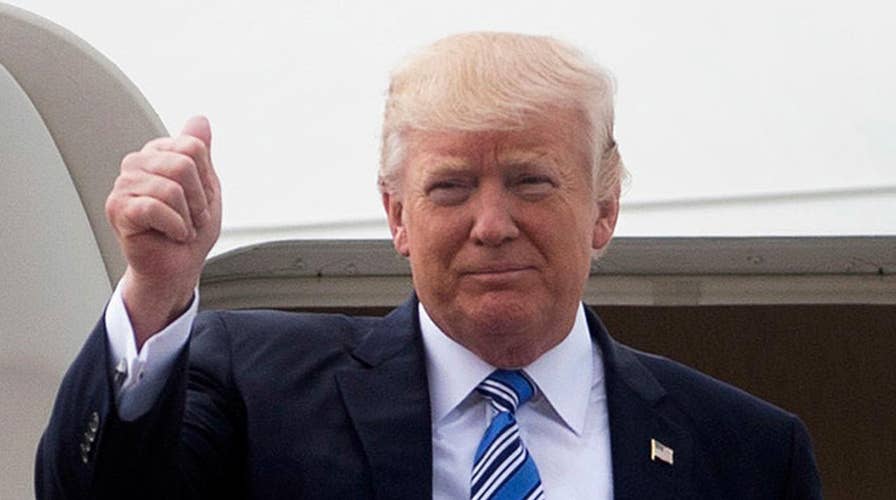Trump's first stop on foreign trip is Saudi Arabia
The president is set to pitch anti-ISIS pact on the visit
As custodian of Islam’s holiest sites, Mecca and Medina, and as leader of the 41-nation Islamic coalition established to combat terror, Saudi Arabia is on the front line of the global fight against radical jihadi terrorism. It is also the ultimate target of terrorist organizations that dream of controlling the center of the Islamic world and the nation’s vast oil wealth. President Trump, in making Riyadh his first overseas stop, is demonstrating this weekend that the U.S.-Saudi strategic relationship is a vital one, and that the kingdom is an essential partner in countering and crushing violent jihadi extremism.
And yet, some critics in the West continue to ridicule any Saudi role in fighting terrorism. They accuse the kingdom of promoting “Wahhabism,” the conservative Islam practiced in Saudi Arabia, arguing that its teachings are a precursor to terrorism. This, despite the fact that the kingdom is itself in the crosshairs of ISIS, al-Qaeda and a revolutionary and belligerent Iran and has seen multiple terror attacks since 1995.
In truth, the Saudi government understands that it has a problem, and it is working to temper the intolerance and rigid thinking of its clerics, a process that will be durable only if done gradually. Part of reforming its reactionary, conservative religious establishment involves utilizing it as a force that, while still not liberal by Western standards, can leverage its considerable stature, prestige and influence in the Muslim world to outlaw all forms of terrorism and ostracize those who promote them.
Saudi Arabia’s progress in the fight against extremism will be also be marked by Mr. Trump when he attends the opening of a center in Riyadh intended to fight radicalism.
“By establishing and operating this center, our Muslim friends, including Saudi Arabia, are taking a firm stand against extremism and those who adopt a perverted interpretation of religion to advance their criminal and political agendas,” National Security Adviser H.R. McMaster told journalists earlier this week.
The kingdom is well-versed and battle-tested in this fight. The Saudi government has built a world-class anti-terrorism capability that uses intelligence, community outreach, rehabilitation and, when necessary, brute force to fight terrorism, perhaps more effectively than any other country facing such militancy in its homeland.
Saudi Arabia’s commitment to the fight against terrorism may be hard to fathom for many Americans. After all, in the confusion following the terror attacks of Sept. 11, 2001, a narrative developed that the terrorists attacked America because they wanted to change the American way of life.
In fact, Al Qaeda – a strain of which became ISIS – has never held illusions about its capacity to spread its ideology in the United States. Instead, the 9/11 attacks were highly strategic, designed with one goal: to sever the strong Saudi–U.S. alliance. There is a reason Al Qaeda deliberately chose 15 Saudis among the hijackers. It was not because of “Wahhabism” or because of a secret Saudi hatred of the Western way of life. It was because Al Qaeda’s goal has been, and remains, the provocation of a U.S.-Saudi divorce.
Al Qaeda then, and ISIS today, hope to use terror to push the U.S. into withdrawing from the Gulf region, because they perceive the American presence as essential to preserving the existing political order in the Arabian Peninsula. Iran shares this strategy with ISIS, which is why it funds and arms destabilizing terror groups in the region, from Hezbollah in Syria to the Houthis in Yemen. Without an American presence in the region, jihadi leaders believe they could overthrow the Gulf monarchies.
Meanwhile, campaigns of terror have only brought the U.S. and Saudi Arabia closer together, deepening a relationship that has endured for three-quarters of a century. Trump’s decision to visit Riyadh first is evidence of that.
This bilateral bond and strengthening alliance against terrorism between the U.S. and Saudi Arabia will ensure that neither Mecca nor Main Street, USA, will fall to the perverted and murderous ideology of radical jihadis. The Trump administration is signaling its strong understanding of the critical value Saudi Arabia brings to the table in its partnership against terror. Now that’s an idea worth spreading in the U.S.









































